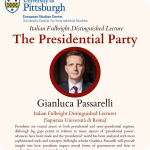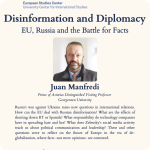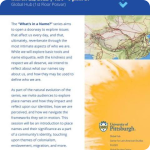Past Events

- Global Hub in Posvar Hall
Meet the 2022 MEET EU Emerging EU Filmmaker in Residence, Simon Elvas. Students are invited to watch (along with the filmmaker) his satirical short film (20 minutes), that explores the intersection of politics, protest and culture. After the film, join Simon in a free-flowing discussion about American perceptions of Sweden, Swedish national identity, the filmmaking process, and more. Learn how Sweden is a world leader in weapon manufacturing, design, and export and how that fact has inspired Simon's current projects. Simon Elvås is the ESC's 2022 MEET EU Emerging EU Filmmaker in Residence. Elvås is a filmmaker from Sweden, working with themes about masculinity and shame within the subjects of climate crisis and Swedish weapon export. Simon studied the bachelor program in directing fiction at Stockholm Academy of Dramatic Art. In this satirical drama, a Turkish military delegation is visiting Sweden and the weapon engineer Josef has been entrusted with selling the new Swedish weapon system. Unfortunately, Joseph's 16-year-old daughter Nadia is a peace activist and together with her friends she is determined to stop the arms deal. When Josef can’t find his keycard, chaos and family quarrels breaks out in the middle of world politics. This event will be in the Global Hub, Posvar Hall 1st Floor. Please note that the University of Pittsburgh is closed to the public. This event is only for Pitt students, faculty, and staff with a valid Pitt Oakland ID.

- Posvar 4217 (Mask Required)
Gianluca Passarelli (Sapienza Università di Roma) Presidents of the Republic are crucial actors in both presidential and semi-presidential regimes. Despite the fact that these two systems represent the majority of all the world’s political systems, the focus on the head of state has only relatively recently been covered comparatively and systematically. Although big gaps still persist in relation to many aspects of ‘presidential power’, advances have been made, and the ‘presidential’ world has been analysed with more sophisticated tools and concepts. However, the ‘presidential party’ remains relatively understudied at both the theoretical and the empirical levels. The ‘party of the president’ is the key political actor that affects presidential activity during his or her mandate. The article aims to present a theoretical framework and a potential guideline for comparative studies. I propose a conceptualisation of the presidential party and the theoretical possible effects of it on the legislature, which might be useful for further empirical analysis.

- Posvar 4130
Juan Luis Manfredi Sánchez - Prince of Asturias Distinguished Visiting Professor, Georgetown University Disinformation in the diplomatic field can be defined as politically motivated false or forged information intended to influence its audience. It is one of the most relevant topics in diplomacy and international relations because diplomats, journalists, military, and policymakers are interested in the way the messages are created, distributed, shared, and understood. Russia's war against Ukraine raises new questions for the discipline: how can the EU deal with Russian disinformation? What are the effects of shutting down RT or Sputnik? What responsibility do technology companies have in spreading hate and lies? What does Zelensky's social media activity teach us about political communication and leadership? These and other questions serve to reflect on the future of Europe in the era of de-globalization, where facts -not mere opinions- are contested. This event will follow a hybrid format.

VIRTUAL VISITING DIPLOMAT PROGRAM JOINTLY SPONSORED BY REINHARDT UNIVERSITY, UNIVERSITY OF PITTSBURGH EUROPEAN STUDIES CENTER & THE INTERNATIONAL STUDIES CONSORTIUM OF GEORGIA (ISCOG)* - CELEBRATING 28 YEARS OF SERVICE proudly presents LET’S TALK UNITED KINGDOM (UK) & WALES WITH BRITISH CONSUL GENERAL IN ATLANTA, ANDREW STAUNTON & DR. ZOWIE HAY, HEAD OF NORTH AMERICA FOR THE WELSH GOVERNMENT AT THE BRITISH EMBASSY IN WASHINGTON, D. C. Mr. Andrew Staunton came to Atlanta as Her Majesty’s Consul General in June 2018. He is the senior UK government representative in the Southeast and leads a team which works to promote UK-US cultural relations, trade and investment, conduct public diplomacy, and builds scientific and research co-operation. Andrew was born in Glasgow, Scotland and he and wife Rebecca have two adult children living in the U. K. Since joining the UK’s diplomatic service in 1987, Andrew has served overseas in Greece, Ireland, China, France, Romania and Canada. He also sits on the Marshall Scholarship selection committee. Dr. Zowie Hay is Head of North America for Welsh Government. Based in the British Embassy in Washington DC and oversees a team that has a presence in Atlanta, Chicago, New York, San Francisco and Montreal. She is the senior diplomat for Wales in North America, joined the Welsh Government in 2011 and has held posts in policy research and evaluation, and as Head of Natural Resources lead on the policy development for the ground-breaking Environment Act (Wales). Before relocating to the USA, Zowie was based in Welsh Treasury, where she led on strategic planning for the Welsh Budget, and subsequently served as Head of Intergovernmental Relations for Tax Strategy and EU Exit. Zowie holds a BA in Politics and International Relations from Lancaster University, an MA in International Relations and Mandarin from the University of Durham and received a PhD in Political Science from Texas A&M University.

- 5601 Posvar
This session of the on-going Teach In on the War on Ukraine will explore Europe and NATO’s role in the war, including the prospects for Ukrainian membership in the EU or NATO. How has EU foreign policy shifted in light of Russia’s invasion of Ukraine? How is Europe responding to the new wave of refugees fleeing the fighting? And what do we make of the nuclear posturing coming out of Moscow? Speakers: Burcu Savun (Political Science), William Spaniel (Political Science), Gregor Thum (History). Moderated by Jae-Jae Spoon (Political Science)

- Dr. Abdesalam Soudi
- Virtual Format - Zoom
Dr. Abdesalam Soudi serves as Professor, Cultural Competence Consultant, and Cultural and Linguistic Competence Master’s Course Co-Director, Family Medicine Department at the University of Pittsburgh Medical Center and University of Pittsburgh. He is a Sociolinguist recognized for several scholarly accomplishments in Conversation Analysis, Cultural and Linguistic Diversity, Arabic Linguistics, Electronic Health Records, Cultural Competency in medical practice. He leads a cross-disciplinary Humanities in Health initiative (HinH). With a passion for discovering new findings and sharing knowledge, he will discuss the importance of cultural competency across all disciplines, from humanities to healthcare, in global initiatives around the world. To Register:https://pitt.zoom.us/meeting/register/tJYqdeyqqDsrEtcNibkJ0YKhLHsIRTmTpFoG

- Timm Beichelt (Institute for European Studies, European University Viadrina)
- Zoom
The conditions on the Ukrainian border and throughout Europe are rapidly changing. Peace and security in Europe are in doubt and the reach of diplomacy seems to be limited. Often overlooked in the US media, Germany plays a key role in the decision-making process on the ground, given her status as an economic engine and primary trading partner with Ukraine and Russia. Germany's new government has to balance its policies between contradicting aims of history, politics, civil foreign policy, and the EU, as an emerging international power. Timm Beichelt from the European University Viadrina will offer insights into the interests, motivations, and decisions of the key players in German foreign policy regarding Russia and Ukraine. Professor Timm Beichelt is Director of the Institute for European Studies at the European University Viadrina. Positioned on the borders of Germany and Poland, Viadrina is a vibrant center for the analysis of European dynamics, and the Institute has deep connections to Poland, Ukraine, and many other European countries. Professor Beichelt has published extensively on European Studies and Europeanization processes. His most recent book is forthcoming in English translation: Homo Emotionalis: On Feelings in Politics (2022). For his book Deutschland in Europa (Springer VS, 2015), he worked as an embedded researcher in the German Foreign Ministry for several months. Register to attend here: https://pitt.zoom.us/meeting/register/tJ0sdO2trjkoG9ULDMqgSTPUD2pyDPGVc-p1

- Global Hub - 1st Floor Posvar
The “What’s in a Name?” series aims to open a doorway to explore issues that affect us every day, and that, ultimately, reverberate through the most intimate aspects of who we are. While we will explore basic tools and name etiquette, with the kindness and respect we all deserve, we intend to reflect about what our names say about us, and how they may be used to define who we are. As part of the natural evolution of the series, we invite audiences explore place names and how they impact and reflect upon our identities, how we are perceived, and how we navigate the frameworks they set in motion. This session will be an introduction to place names and their significance as a part of a community's identity, touching upon themes of colonialism, enslavement, migration, and more. Presenters: Dr. Ruth Mostern, Director, World History Center Dr. Keila Grinberg, Director, Center for Latin American Studies

- Zoom
Spring Mini Course: Technology, Humanity, and Social Justice - SUNDAY ● Session 8 – 8:30AM-9:30AM: Comparing Disciplines and Perspectives ● Session 9 – 9:45AM-11:45AM: Practicing Community Discussions on Inclusive Approaches: A Case Study Activity ● Session 10 – 12:00PM-1:00PM: Workshopping Your Stakeholder Profiles

- Andrew Meade McGee, Jacqueline Lipton, Song Shi
- Zoom
Spring Mini-Course: Technology, Humanity, and Social Justice - SATURDAY ● Session 3 – 8:30AM-10:00AM: Group Activity: Analyzing Governance and Technology Case Study ● Session 4 – 10:15AM-11:30AM: Andrew Meade McGee, Visiting Assistant Professor, Department of History, Carnegie Mellon University LUNCH 11:30AM-1:00PM ● Session 5 – 1:00PM-2:15PM: Jacqueline Lipton, Assistant Professor of Legal Writing, School of Law, University of Pittsburgh ● Session 6 – 2:30PM-3:45PM: Song Shi, Visiting Assistant Professor, Department of Informatics and Networked Systems, University of Pittsburgh ● Session 7 – 4:00PM-5:30PM: Group Activity: Comparing Analyses Governance and Technology Case Studies

- Erin Dalton & Roy Austin
- Zoom
First session of Spring Mini-Course: Technology, Humanity, and Social Justice 5:00PM-5:15PM: Welcome Remarks and Overview of Course Session 1 – 5:15PM-6:30PM: Erin Dalton, Director of the Allegheny County Department of Human Services Session 2 – 6:45PM-8:00PM: Roy Austin, VP of Civil Rights and Deputy General Counsel of Facebook

- Posvar 5201
26 Years ago, Ike Nnaebue attempted to flee Nigeria for a better life in Europe. Now, as a Lagos-based film director of No U- Turn, he documents the journey of West African migrants who attempt to reach the continent today. This portrays the causes and motivations of migrants who risk their lives for opportunities abroad.

- Veronica Dristas
As humans rely more and more on electronic devices to support their everyday activities, there are ever present warnings about the impacts such reliance has on human autonomy ranging from who owns and controls information networks, the inequitable impact of technology consumption on peoples and places, varying accessibility of technology around the globe, and the promises and limitations of technology in improving human health. By engaging in technology as a lens, this sequence of weekend micro-courses encourages students to examine technology as a system disproportionately impacting humanity by enabling and constraining human rights of groups of people around the globe. With a multi-disciplinary focus, the course invites researchers and practitioners from the University of Pittsburgh, Carnegie Mellon, and relevant fields more broadly. The course will occur on Friday, March 18th, Saturday, March 19th, and Sunday, March 21st. Engagement in the course should be synchronous; accommodations for those in significant time zone differences will be provided to allow enrollment and completion of all elements of the weekend. A pre-course video review of the major course assignment will need to be completed prior to the course starting. Students must register for this course through PeopleSoft, which can be accessed via their my.pitt account.

- Posvar 5108
Wilson is a Bissau-Guinean refugee, who settles in Budapest, Hungary, after fleeing his country's civil war. Having lost his wife and daughters to the conflict, he builds a new life as a market security guard while trying to pass the country's citizenship test. After taking in Shirin, a pregnant refugee from an who arrives illegally, and a local Hungarian tutor named, Mari, with whom he falls in love, their devotion to one another other is tested. Through differing life philosophies, prejudice, and the threat of deportation, they struggle to navigate their lives lives as refugees in Hungarian society.

- Elia Moutamid
- Zoom
The University of Pittsburgh Italian program will host a discussion of the film Kufid (2020). We will be joined by the film's director, Elia Moutamid, and by critic and filmmaker Simone Brioni. Discussion will be in English; the film is in Italian with English subtitles. Everyone who registers will also receive a link that can be used to watch the film, streaming, whenever you wish.
- ‹ previous
- 34 of 51
- next ›
